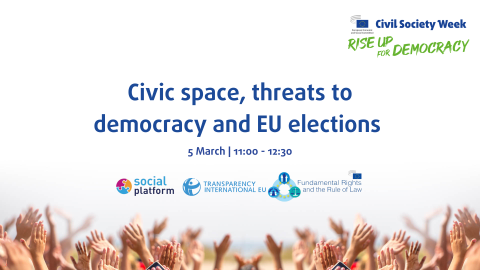European Economic
and Social Committee
Civic Space, threats to democracy and EU elections
Webstreaming 05/52 . Back to Agenda
Draft Agenda
11:00 – 11:10: Welcome and setting the scene by Carlotta Besozzi, Director, Civil Society Europe.
11:10 – 11:20: Presentation of EESC Opinion by Christian Moos, EESC member, Civil Society Organisations’ Group (Group III)
11:20 – 12:20: Panel discussion taking into account questions/input from the floor
- Moderated by Carlotta Besozzi, Director, Civil Society Europe
- Vitor Teixeira, Transparency International EU
- Riccardo Rossella, Social Platform / Civil Society Europe
- Representative of the EU Agency for Fundamental Rights (FRA)
- Marie-Helene Boulanger, Head of Unit Democracy, Union Citizenship and Free Movement, DG JUST
- Sergey Lagodinsky MEP, Greens/EFA group
- Marta Pardavi, Co-Chair, Hungarian Helsinki Committee
12:20 – 12:30: Closing remarks by Carlotta Besozzi, Director, Civil Society Europe.
Concept Note
According to the Eurobarometer survey carried out a year before the 2024 European elections, democracy is the core value that citizens want the European Parliament to defend.
In December 2023, the European Commission also adopted its proposal for a Defence of Democracy Package. The initiative is a welcome step towards protecting and strengthening democracy in the EU, but the instruments used for its implementation must be carefully balanced to serve this purpose and fully empower civil society as democratic actors.
A thriving civil society is an important pillar of healthy democracies. All over Europe, civil society actors promote and protect democracy, the rule of law and fundamental rights, make sure that underrepresented voices are heard, and support governments and institutions in responding to people needs.
However, a range of challenges still limit the space for civil society in the EU and its opportunities to meaningfully contribute to policymaking. Civil society organisations and human rights defenders continue to experience threats and attacks, legal and administrative barriers, and difficulties accessing funding, documents and decision makers. Trends of shrinking civic space – and calls to reverse them – have also been highlighted by the European Parliament, the European Commission, and the European Council.
The aim of this session is to discuss the links between shrinking civic space and the state of play of democracy in the EU against the backdrop of next year's European elections, in a context of increasing risk of disinformation and interference.
Questions for discussion will focus on:
- The state of play of civic space in the EU, including current trends and barriers that still exist
- The views of civil society and policymakers on the links between shrinking civic space and threats to democracy, as well as potential solutions
- Proposals from civil society for overcoming barriers to civic space and strengthening democracy in the EU.
